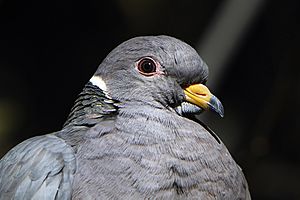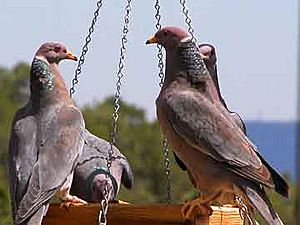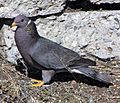Band-tailed pigeon facts for kids
Quick facts for kids Band-tailed pigeon |
|
|---|---|
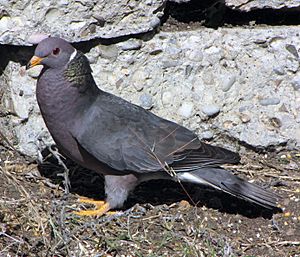 |
|
| In San Luis Obispo, California, USA | |
| Conservation status | |
| Scientific classification | |
| Genus: |
Patagioenas
|
| Species: |
fasciata
|
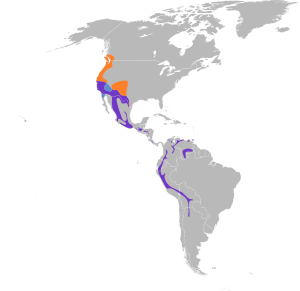 |
|
| Synonyms | |
|
Columba fasciata (Say, 1823) |
|
The band-tailed pigeon (Patagioenas fasciata) is a medium-sized bird that lives in North and South America. It is related to the Chilean pigeon and the ring-tailed pigeon. These birds all have a special band on their tail and shiny, colorful feathers on their necks.
There are at least eight different types, or subspecies, of the band-tailed pigeon. Some experts even think there are two main species: the northern band-tailed pigeon and the southern band-tailed pigeon.
These pigeons live in many places, from British Columbia in Canada, down through the western United States (like Washington, Oregon, California, and Arizona). They also live in higher areas of Mexico and Central America, all the way to northern Argentina.
In autumn, many band-tailed pigeons fly to warmer places. They move into northern California, New Mexico, and parts of Utah and Colorado. You can find them from near sea level up to about 3,600 meters (11,800 feet) high. They usually live in forests with oak trees, pine trees, or other cone-bearing trees. They love to eat seeds, especially acorns, as well as berries and small fruits.
Meet the Band-tailed Pigeon
The band-tailed pigeon is the biggest pigeon found in North America. It can be from 33 to 40 centimeters (13 to 16 inches) long. These birds usually weigh between 225 and 515 grams (8 to 18 ounces). Pigeons living near the coast are often a bit bigger than those living inland.
This pigeon has mostly gray feathers, which are a bit darker on its back. Its head and belly might have a light pink color, especially in adult males. The lower part of its tail is also light, which is how it got its name. Its beak and feet are yellow, which helps you spot them if you are close enough. Adult pigeons have shiny green feathers on the back of their neck, next to a thin white band. Young pigeons have white edges on their feathers, making them look a bit scaly.
Life and Habits of the Pigeon
Band-tailed pigeons are usually quiet birds, especially for pigeons! Their call sounds a bit like an owl, a low huu-ooh sound that goes up and then down. They can also make some loud, harsh squawking noises when they need to.
When it's time to have babies, the pigeon builds a simple nest from twigs. They usually lay one or two eggs in this nest. When they are not breeding, these pigeons often fly together in large groups. Sometimes there are more than 50 birds in a flock! They often travel around to find food, especially when acorns are ready to eat. They might also move to lower areas or other places outside their usual breeding grounds.
These birds often gather at mineral springs to drink. Scientists are still trying to understand exactly why they do this. Besides acorns and other seeds, band-tailed pigeons also eat fruits like Pacific madrona and Toyon berries when they are in season. You might even see them visiting bird feeders in your backyard!
With more English Holly and English Ivy being planted in gardens in western North America, these pigeons are now often seen in suburban areas too.
Did you know that a tiny louse (a type of parasite) called Columbicola extinctus was once thought to be gone forever? It was believed to have died out with the passenger pigeon. But it was recently found again on the band-tailed pigeon! The band-tailed pigeon is very closely related to the passenger pigeon. Because of this, scientists are studying the band-tailed pigeon to see if it can help in efforts to bring back the extinct passenger pigeon.
Images for kids
-
In San Luis Obispo, California, USA
See also
 In Spanish: Paloma de collar para niños
In Spanish: Paloma de collar para niños



